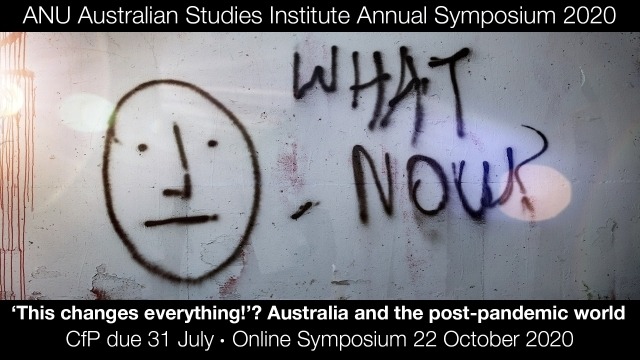Greetings from "Australia and the post-pandemic world", a free online symposium being hosted by the Australian Studies Institute. This is on all day at the Australian National University until 5pm. I will be on a panel at 1pm on "education and online learning in a pandemic". An unusual format is being used, where each speaker prepared a 5 to 8 minute video in advance, so the live sessions move straight to discussion. It would be interesting to see if this format continues after face to face symposia are reintroduced.
I watched the videos for my session on education at 1pm and here are some notes:
Session 5: Education and online learning in a pandemic
E-learning and virtual transformation of histology andpathology learning during COVID-19: its impact on student
learning experience and outcome, Ms Samantha Waugh, Dr James Devin & Dr Vinod Gopalan, School of Medicine, Griffith University
Used Blackboard Collaborate Ultra for live video lectures, including the use of a virtual microscope. Practicals with a tutor via Microsoft Teams. Online library of histology images. Student survey found the online lectures were as good as face to face and practicals better online, with students agreeing this should continue. Student exam results went up by 10%. My comments: But how was the assessment done? Also as noted these students had already completed a year of study face to face: would this have been as well received for studnts new to university?
Lessons to be learnt from the impact of COVID-19 on
medical students’ wellbeing and learning experience, Dr. Anna Efstathiadou & Dr Suja Pillai, University of Queensland
Students were encouraged to undertake extracurricular craft activities. These reduced student stress by taking them away from their subject area for a time. My comments: Some students may be reluctant to engage in extra curricular activities. I suggest co-curricular ones, which are relevant to their studies and for which course credit is received. These can be, for example, on working in teams, communicating with the public and entrepreneurship.
A Possible Solution to Bridge the Gap between off-Shore
Students and Australian High Education
Dr Ying Zhu, Adelaide Bio-Tech Development (Hengqin) Ltd
This presentation points to the difficulties for the 80,000 Chinese students enrolled in Australian universities but unable to get to Australia. Distance Learning had problems with time zones between Australia and China as well as the distractions of studying at home. It is suggested that local tutorials in China can be a useful alternative. My comment: These are issues and solutions which have been discussed, at length, in the distance education literature. No sooner had the Open University UK started distance education fifty years ago than students spontaneously started organizing their own study groups and arranging tutorial at local vocational campuses. As an international online student (of distance education) from 2013 to 2017, I found myself not only studying the phenomenon, but also doing it myself. However, providing F2F tutorials locally is a very high cost for an institution.
Australian Higher Education in the Post-pandemic World
Mr Tom Worthington, Research School of Computer Science, ANU
The other speakers focused on the impact of COVID-19 on education, but I had spent a decade working on how to deliver education online. In 2019 I implemented an education design with blended delivery. This was designed so that if international students could not get to campus due to a regional crisis, the face to face components could be quickly replaced with video. I had designed this in case of a war, but it worked fine in 2020 for COVID-19. The interesting question for me is not what was done for COVID-19, that was just standard distance education, but what happens next?
My notes are at:http://www.tomw.net.au/education/he_after_covid19/HE%20Postpandemic%20Tom%20W.pdf
From butcher’s paper to Zoom breakouts: developments
and transformations in Australian trade union education
Dr Alice Garner, Centre for Vocational and Educational Policy, University of Melbourne, Professor Anthony Forsyth, Graduate School of Business and Law, RMIT University Dr Mary Leahy, Centre for Vocational and Educational Policy, Melbourne Graduate School of Education Ms Renee Burns, University of Melbourne Law School
This fascinating presentation is on the Trade Union Training Authority (TUTA), which was a joint government/union activity to provide vocational education in Australia. My comments: As a public servant and union member I attended TUTA training and found it very useful. Today's TAFEs have some of the flavor of still. The ANU's TechLauncher program, which I help teach, has some small element of this as well, with tutors and students who are practicing professionals who come with a workplace perspective very different to university staff, who are primarily researchers.

No comments:
Post a Comment